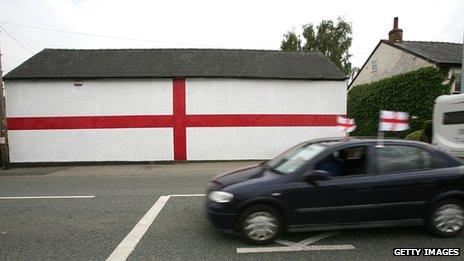Euro 2012: Where are the England flags?
- Published

England flags on cars have been a fixture since Euro 96
It can be hard to go anywhere in England at the moment without being greeted by a sea of red, white and blue.
From flags to bunting to paper plates, shops are stocked with a variety of items branded with the union jack to help people celebrate the Queen's Diamond Jubilee and London 2012.
But the Olympics are not the only major sports tournament this summer.
This week the Euros will get under way in Poland and Ukraine.
Previous football tournaments have been preceded by the St George's flag fluttering from cars and homes across the land.
But where are the England flags this year?
Olympics obsession
Kevin Miles, international director of the Football Supporters' Federation, said it was possible the Euros were being overshadowed by the Olympics.
He said: "I have had people I work with overseas saying to me 'the British are obsessed with the Olympics' so it may be the Euros are getting lost."
World Cup Willie wore a British flag shirt despite being an English lion
He said he first noticed England flags replacing union jack flags at Euro 96.
"You had Scotland competing and they rarely qualify and the Scottish identity was emerging more with devolution by the Blair government in 97," he said.
He added he did not think the lack of flags was to do with fans becoming more realistic about England's chances in international tournaments.
"I work with fans who go to England games and they've never been carried away with England's chances. The hype tends to come from people who haven't gone so maybe they're getting a bit wiser."
He said the chance to buy Olympics merchandise could also be affecting sales of England supporters items like flags and banners.
"You don't normally get Olympic merchandise for sale unless your country is hosting the tournament, you didn't see Team GB stuff in Sydney or Beijing so it does seem to be a host nation thing," he said.
Matt Taylor is a sports historian at the International Centre for Sports History and Culture at De Montfort University.
90 minutes
He urged caution in assuming the union jack flag had replaced the flag of St George in terms of popularity.
"I still think the jury's out this year but it is interesting that with the Olympics and Paralympics that at the moment it seems the Euros aren't as significant.
"Certain flags can become less prominent while others become more significant - what flags mean can change."
He said footage of the 1966 World Cup, which was hosted in England, showed England fans waving British flags while even the tournament's mascot, World Cup Willie, was a lion wearing a British flag patterned football shirt.
"This represents in some ways a fusing and a confusion between English people and English and British identity," he said.
"Identity can be quite complex. It's not necessarily easy to express Englishness or Britishness but there is an alternative form of expression very much linked to football - the 90 minutes of patriotism that doesn't necessarily last beyond the match."
Thousands of people waved union jacks to celebrate the Queen's Diamond Jubilee at the weekend
He said associations between the St George flag and the far right could mean many people preferred the British flag as they saw it as "more inclusive".
"It's possibly easier to consider yourself a part of Britain due to the complex nature of national identity but it is something people make choices about all the time when they decide which flag to fly from their home or car."
Suppressed identity
The Royal Society of St George celebrates England and English culture.
John Clemence, one of the society's vice presidents, said there was a "sensitivity" about flying the flag of St George that did not come with the union jack.
"We want to get rid of the idea that there are racist connections to flying the flag.
"On St George's Day if I choose to fly the flag it isn't at the expense of my Turkish neighbour up the road," he said.
He believes people are more comfortable flying England's flag now but it was appropriate to fly the union jack over the Jubilee weekend.
"People who normally fly England flags were flying the union flag for the Jubilee," he said.
"We were celebrating the Queen and she is the Queen of Britain."
But he said this would not be extended to Euro 2012: "It's the habit of the English to suppress their identity within the union but when supporters go to matches they won't be flying the union flag they'll be flying the flag of St George."